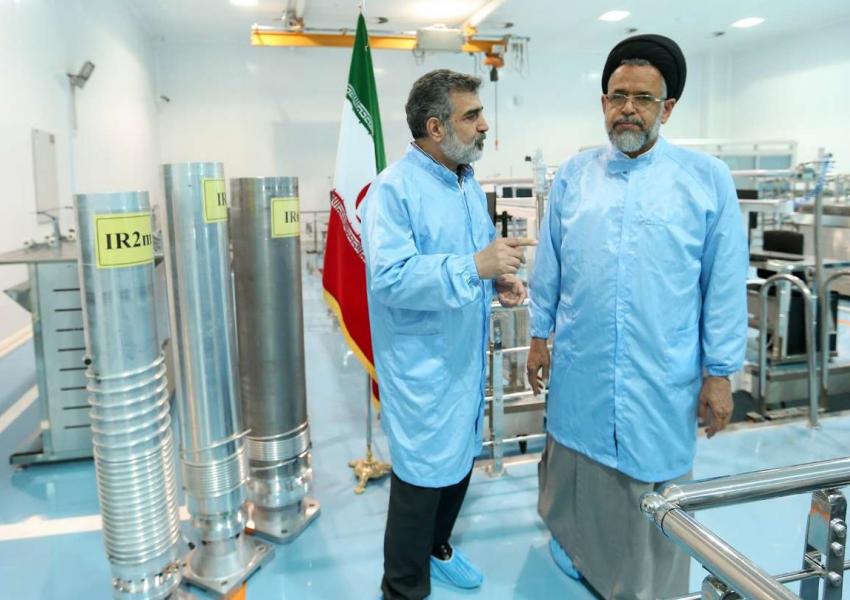
Intelligence Minister Warns Iran May Produce Nuclear Bomb If Cornered
Iranian Intelligence Minister Mahmoud Alavi on Monday suggested Iran might develop nuclear weapons if “backed into a corner.” His remarks on IRIB Channel 2 on Monday [February 8] referred to a ruling against nuclear weapons made by Supreme Leader Ali Khamenei.
“The Supreme Leader has declared that nuclear weapons are haram (religiously prohibited),” Alavi said. Alluding to the map of Iran – which somehow resembles a cat – the minister suggested that a peaceful cat, once “backed into a corner,” might behave differently. “It won’t be Iran's fault anymore if they push it in that direction,” Alavi noted.
Khamenei’s fatwa, or religious edict, against the acquisition or manufacture of nuclear weapons was first revealed publicly in a statement from Iran to the International Atomic Agency (IAEA) in Vienna in August 2005. Khamenei ruled that the production, stockpiling and use of nuclear weapons were all forbidden under Islam.
But Alavi’s hint at the Fatwa being flexible is the second such declaration in recent weeks. Former Iranian diplomat and IRGC brigadier-general Amir Mousavi in a January 30 interview with al-Mayadeen television said, “A fatwa is not permanent, according to Jaafari Shia jurisprudence. A fatwa is issued in accordance with developing circumstances. Therefore, I believe that if the Americans and Zionists act in a dangerous manner, the fatwa might be changed.”
An analysis published by the Washington Institute February 4 argues that “Tehran’s national security decisionmaking is dictated not by religious precepts, but by the principle of ‘regime expediency’ (maslahat-e nezam), whose paramount concern is the survival of the post-revolutionary power structure. “
American historian and investigative journalist Gareth Porter has argued that the Iranian leadership’s opposition to nuclear weapons goes back further. Porter highlighted an interview he did in 2014 with Mohsen Rafighdoust, Minister of the Islamic Revolutionary Guard Corps (IRGC) throughout Iran’s 1980-88 war with Iraq and responsible for weapons procurement. Rafighdoust told Porter that Ruhollah Khomeini, Khamenei’s predecessor as leader, had, despite Iraq’s use of chemical weapons, twice banned nuclear and chemical weapons during the war when Rafighdoust had raised the issue.
However, Iran did have a concealed uranium enrichment and weapons-design program prior to 2003 and continued enrichment, boosting it to 20 percent by 2009 after the international community offered incentives and assistance for a civilian nuclear program if Tehran stopped expanding its activities..
President Hassan Rouhani and Foreign Minister Mohammad Javad Zarif have repeatedly quoted Khamenei’s religious ban on nuclear weapons as evidence that Iran has no intention of diverting its nuclear program into producing weapons. In his interview with CNN’s Christian Amanpour on February 2, Zarif said Iran had not sought nuclear weapons for several reasons.
“If we wanted to build a nuclear weapon, we could have done it some time ago,” Zarif said. “But we decided that nuclear weapons…would not augment our security and are in contradiction to our…ideological views. And that is why we never pursued nuclear weapons.”
While the fatwa did not preclude world powers seeking limitations on Iran’s nuclear program – including the 2015 nuclear agreement – President Barack Obama referred to Khamenei’s ruling in his United Nations General Assembly speech in September 2013. Other officials now members of the Biden administration, including Obama’s Secretary of State John Kerry, have also cited the fatwa.
Khamenei himself referred to his ruling a few days after the nuclear deal, known as the JCPOA (Joint Comprehensive Plan of Action), was signed in July, 2015. “The Americans say they stopped Iran from acquiring a nuclear weapon. They know it’s not true. We had a fatwa, declaring nuclear weapons to be religiously forbidden under Islamic law. It had nothing to do with the nuclear talks.”






